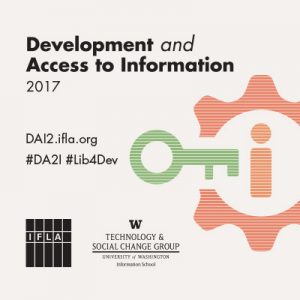 Ten years ago, Oxfam launched a successful campaign based on the proverb: ‘Give a man a fish, he will eat for a day. Teach a man to fish, and he will eat for a lifetime’.
Ten years ago, Oxfam launched a successful campaign based on the proverb: ‘Give a man a fish, he will eat for a day. Teach a man to fish, and he will eat for a lifetime’.
The idea is an easy one to understand – sustainable solutions to people’s problems come not from handouts, but from teaching them how to become economically independent. And it is applicable everywhere, not just in developing countries.
For libraries, there is a third step. Give someone access to information, and they can build new skills, stronger communities and better lives. They can not only survive, but thrive. The Development and Access to Information (DA2I) report, to be launched at the High Level Political Forum, shows how.
Access is more than formal education
The world is changing for everyone. To adapt, we need to be able to take the right decisions, at all points in our life. Even in the most developed countries, the process of acquiring, processing and applying information cannot stop with the end of formal education. And elsewhere, many people have had only limited schooling, if any at all.
Access to information, from the results of cutting edge medical research to basic hygiene tips, from the latest crop prices to data about traffic congestion, is vital. And it needs to be delivered in a way that allows everyone to benefit – women and men, poor and rich, rural and urban.
Access is more than computers and cables
It is undeniable that the Internet has created unprecedented opportunities to discover, create and share information. Never have we been able to find so many facts and opinions so quickly, collaborate across borders so easily, or apply such powerful tools to make new discoveries.
Getting online requires networks and hardware, as well as low-cost or free options, such as public access points, for those who have limited resources. A mixture of investment, innovative tools and business models, and the right regulation will be essential.
Without relevant content in a language the user understands, and without the skills and attitudes necessary to feel confident, the Internet cannot realise its potential. At its best, the Internet should not only allow users to consume, but to produce the information that will help others in their communities learn and grow as well.
Not just access. Meaningful, inclusive access
As an essential ingredient of development, we need better to understand the degree to which people around the world have the possibility to access information. We need also to understand what it takes to make this access useful.
The Development and Access to Information (DA2I) Report, to be launched by IFLA and TASCHA on 17 July 2017, marks the starting point of a major new effort to achieve this. By setting out a set of baseline indicators, it underlines the challenges we face today, and provides a benchmark allowing readers to monitor progress in future.
Addressing four of the focus SDGs of this year’s HLPF, the DA2I report also illustrates how meaningful access to information delivers results in the fields of agriculture, health, gender equality and innovation.
Furthermore, it underlines the importance of forming partnerships between actors to deliver access to information – national and local governments, business, practitioners, researchers.
Libraries are central to such partnerships. They do not just offer access to information, but they make it meaningful and inclusive. From enabling international research collaborations, to delivering the skills, support and safe environment vulnerable groups at a local level need, libraries help citizens exercise their right to development and improve their lives.
**
Development and Access to Information (DA2I) is the first of a series of annual reports that will monitor the progress countries are making towards fulfilling their commitment to promote meaningful access to information as part of the United Nations Sustainable Development Goals.
Produced by the International Federation of Library Associations and Institutions (IFLA), in partnership with the Technology and Social Change Group at the University of Washington, it underlines the invaluable contribution that information access, particularly through libraries, makes to promoting more socially and economically inclusive societies. The report will be launched on 17 July, in the margins of the High Level Political Forum.
You can learn more about the DA2I report on the dedicated website (https://da2i.ifla.org/), as well as register to receive a notification when the report has been launched and it is ready for download!
Learn more about the work of IFLA in Libraries, Development and the United Nations 2030 Agenda: www.ifla.org/libraries-development